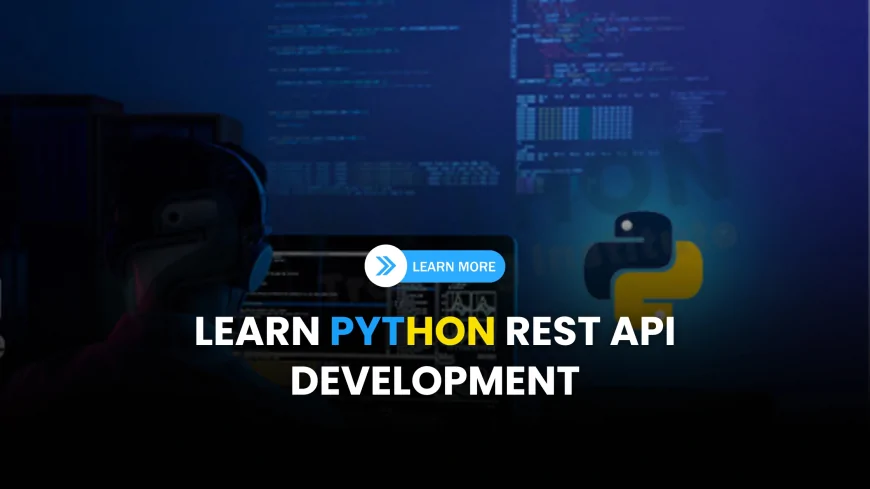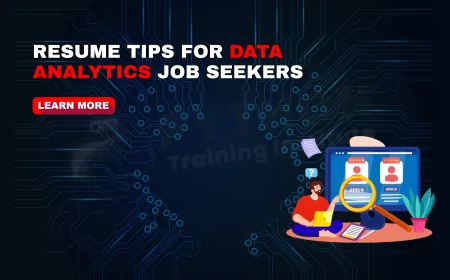Learn Python REST API Development Course in Pune | Top Python REST API Training Programs in Pune
Join Python REST API development course in Pune. Learn Flask, FastAPI, JWT, Docker & CI/CD with real-world projects and job-ready certification.

Table of Contents
- Introduction: Why Learn Python REST APIs?
- Why Choose Pune for Python REST API Training?
- Who Should Enroll?
- Course Learning Objectives
- In‑Depth Syllabus Overview
- Training & Project‑Based Learning
- Tools & Tech Stack Covered
- Certification & Career Support
- Fees, Duration & Batch Schedule
- Online vs. Classroom Training
- Career Paths After Course
- Real‑World Applications
- FAQs
- Conclusion
Introduction: Why Learn Python REST APIs?
Learning Python REST APIs is essential for modern developers who aim to build scalable, efficient, and secure web applications. REST (Representational State Transfer) is the most widely adopted architectural style for creating web services, and Python offers powerful libraries like Flask, FastAPI, and Django REST Framework (DRF) that make API development clean, fast, and efficient. Here’s why learning Python REST APIs is a smart move:
- High Demand in the Job Market: REST API skills are in demand for backend developers, data engineers, and full-stack developers. Companies rely on REST APIs for microservices, mobile app backends, and third-party integrations.
- Python’s Simplicity & Power: Python is known for its readable syntax and rapid development. Coupled with REST frameworks, it allows you to create APIs in just a few lines of code.
- Essential for Backend & Full-Stack Roles: If you’re targeting roles in backend engineering or full-stack development, knowing how to build and consume RESTful services is non-negotiable.
- Integration with Front-End & Mobile Apps: REST APIs serve as the bridge between front-end interfaces (React, Angular, mobile apps) and server-side databases and logic.
- Supports Microservices Architecture: REST APIs are the foundation of microservices-based systems—an architecture increasingly adopted by startups and enterprise-grade applications.
- Real-Time Project Experience: Learning to build REST APIs with Python allows you to handle real-world tasks like user authentication, CRUD operations, deployment using Docker, and connecting with databases like PostgreSQL and MongoDB.
- Future-Proof Skill: REST isn’t going away anytime soon, and RESTful services are used by platforms like Google, Facebook, Twitter, and Amazon Web Services (AWS).
Whether you're a beginner transitioning to backend development or an experienced Python developer aiming to enhance your portfolio, REST API development is a must-have skill that opens up abundant job and freelancing opportunities—especially in tech hubs like Pune.
Why Choose Pune for Python REST API Training?
Pune has emerged as one of India’s fastest-growing IT and education hubs. For aspiring developers, engineers, and tech enthusiasts looking to master Python REST API development, Pune offers a perfect ecosystem of opportunity, mentorship, and practical exposure. Here's why:
-
Home to Top IT Companies:
Pune hosts numerous MNCs and startups such as TCS, Infosys, Cognizant, Tech Mahindra, and Zensar that actively recruit Python developers with REST API expertise. -
Vibrant Developer Community:
Pune has a thriving tech community with regular Python meetups, coding hackathons, and workshops focused on RESTful API architecture, DevOps, and backend engineering. -
Affordable Yet Quality Training:
Compared to other metro cities, Pune offers high-quality coaching institutes with affordable fees and industry-relevant Python REST API courses. -
Skilled Trainers & Mentors:
Many instructors in Pune come from strong industry backgrounds and bring real-world API experience using Flask, FastAPI, Django REST Framework, and microservices architecture. -
Real-World Projects & Internships:
Training programs in Pune often include hands-on projects such as building authentication APIs, token-based authorization with JWT, integration with databases, and deployment with Docker and CI/CD pipelines. -
Flexible Learning Modes:
Pune-based institutes offer both classroom and online REST API training modes—ideal for working professionals, students, and freelancers. -
Job-Oriented Curriculum:
Many Python REST API courses in Pune are designed to align with the actual job market needs, including interview preparation, resume-building, Git/GitHub practice, and placement support. -
Gateway to Career Growth:
With Pune’s tech ecosystem booming, completing a REST API course here boosts your chances of landing high-paying roles in product-based companies and tech startups.
Whether you're a fresh graduate, career switcher, or experienced programmer, Pune provides the ideal mix of expert instruction, practical training, and placement opportunities for mastering Python REST API development.
Who Should Enroll?
This REST API development training is ideal for:
- Python developers moving from scripting to backend engineering.
- Front‑end and mobile developers wanting to build scalable backends.
- QA/test automation engineers who need to test API endpoints.
- Data engineers building data pipelines and microservices.
- DevOps engineers integrating API endpoints into CI/CD workflows.
- Professionals looking to launch careers in backend development, cloud engineering, IoT platforms, or full‑stack roles.
Course Learning Objectives
By the end of this course, you'll be able to:
- Design RESTful APIs using Python frameworks like Flask and FastAPI.
- Implement HTTP methods: GET, POST, PUT, DELETE, PATCH.
- Validate data using Pydantic or Marshmallow schemas.
- Manage database persistence with SQL and ORM (SQLAlchemy).
- Secure APIs with JWT, OAuth2, and middleware.
- Deploy APIs using Docker and AWS/Heroku.
- Write automated tests for API endpoints.
- Practice CI/CD pipelines using GitHub Actions or GitLab CI.
In‑Depth Syllabus Overview
Module 1: HTTP Fundamentals & Python Basics
Review of HTTP methods, status codes, headers, request & response structure. Python refresher on data types, functions, virtual environments, pip.
Module 2: Flask Framework
- Routing, request parsing, blueprints
- Flask-RESTful and error handling
- Flask forms, validation, sessions
Module 3: FastAPI (Modern & High‑Performance)
- API design with dependencies, path and query parameters
- Auto‑generated OpenAPI docs with Swagger UI
- Pydantic-based validation and response models
- Asynchronous endpoints using async/await
Module 4: Database Integration
Implement SQLite/MySQL/PostgreSQL with SQLAlchemy ORM: models, migrations, relationships, transaction management.
Module 5: Authentication & Authorization
Secure APIs using JWT tokens, OAuth2 flows, role/permission-based access, middleware integration.
Module 6: Testing & Automation
Write unit/integration tests using PyTest, coverage metrics, mocking, CI automation for test runs.
Module 7: API Documentation & Versioning
Customize Swagger/OpenAPI docs, add versioning, pagination, filtering, rate limiting.
Module 8: Deployment & DevOps Integration
- Containerizing APIs with Docker
- Using GitHub Actions/GitLab CI for build/deploy pipelines
- Deploy to AWS EC2 ECS/Fargate or Heroku
- Monitoring with Prometheus/Grafana
Module 9: Real‑World Projects
Capstone projects to build complete systems like:
- E-commerce API with authentication and payment integration
- Real-time chat backend using WebSocket
- Microservices architecture with service-to-service communication
- Data ingestion APIs for dashboards and IoT systems
Training & Project‑Based Learning
Core teaching methods include:
- **Live Coding Demonstrations**: Trainers build endpoints live to teach best practices.
- **Hands‑on Labs**: Each student codes along and solves real error/debugging scenarios.
- **Peer‑code Reviews**: Group reviews to improve readability and architectural design.
- **Project Demos**: Students present project modules and API workflows to peers and mentors.
- **Mentorship & Doubt Hours**: Regular roundtable and one‑on‑one mentoring sessions.
Tools & Tech Stack Covered
- Python 3.8+
- Frameworks: Flask, Flask‑RESTful, FastAPI
- Database: PostgreSQL/MySQL/SQLite with SQLAlchemy
- Validation: Pydantic, Marshmallow
- Authentication: JWT, OAuth2
- Testing: PyTest, coverage.py
- Containerization: Docker, Docker Compose
- CI/CD: GitHub Actions, GitLab CI/CD
- Hosting & Monitoring: AWS EC2, ECS, Heroku, Prometheus, Grafana
Certification & Career Support
Upon completion, you'll receive a course completion certificate endorsed by industry partners. Career support includes:
- Resume building with a focus on backend and API roles.
- Mock interview preparation: behavioral, technical, and system design.
- Access to recruiter networks and job portals.
- Internship recommendations with Pune-based startups.
Fees, Duration & Batch Schedule
Typical offerings:
| Course Mode | Duration | Fee Range (₹) |
|---|---|---|
| Weekend (Sat–Sun) | 8–10 weeks | 20,000–30,000 |
| Weekday Evenings (Mon–Thu) | 6–8 weeks | 18,000–28,000 |
| Fast‑Track (2 Weeks Intense) | 40+ hours | 15,000–20,000 |
| Online Live‑Instructor | 6–12 weeks | 15,000–25,000 |
Note: Fees may include lab access, cloud credits, mock interview sessions, placement support.
Online vs. Classroom Training
Both modes offer the same curriculum; choose based on:
- Offline: Direct mentoring, lab facilities, peer synergy, networking.
- Online: Flexibility, recordings, remote access, accessible from anywhere.
Quality remains consistent, with remote tools enabling interactive sessions and code-sharing platforms for collaboration.
Career Paths After Course
- Backend Developer with APIs & Microservices
- Full‑Stack Developer (Python‑based backend)
- DevOps Engineer managing API CI/CD pipelines
- IoT Platform Engineer
- Data Engineer / Pipeline Developer
- Automation Engineer using REST backend
Real‑World Applications of Python REST APIs
- Mobile app backends (Flutter/React Native + FastAPI)
- Dashboard/Data‑analytics APIs
- E‑commerce platforms and payment gateways
- IoT device communication & remote monitoring
- Chat applications and real‑time messaging
- Microservices for financial & IoT domains
FAQs
1. What prior experience is needed?
Basic Python knowledge (loops, functions, data structures) and familiarity with HTTP concepts are recommended.
2. How long is the course?
Between 6 to 12 weeks depending on batch type (fast‑track, weekend, evening, online).
3. Can I enroll while working?
Yes, weekend or evening batches are ideal for working professionals.
4. Do I need to install software beforehand?
Yes—install Python 3.8+, Git, Docker, and code editor like VSCode. Cloud accounts (AWS, Heroku) are optional.
5. Will I work on real projects?
Absolutely. You’ll build multiple REST APIs and complete a capstone project demonstrating full lifecycle development.
6. Do you teach API security?
Yes, we cover JWT authentication, OAuth2.0, CORS, rate limiting, and middleware security best practices.
7. Is there placement support?
Yes, we provide resume reviews, interview mock sessions, and connect with Pune-based startup/MNC recruiters.
8. Will I get a certificate?
Yes, a professionally recognized certificate is awarded after completing all assignments and project deliverables.
9. What frameworks are used?
Flask, Flask‑RESTful, and FastAPI are the primary frameworks taught.
10. Do you cover testing?
Yes, we teach unit and integration testing using PyTest and automation in CI/CD pipelines.
11. Do I learn Docker?
Yes, you’ll containerize your APIs using Docker and deploy them using Docker Compose.
12. What about database integration?
We cover SQLAlchemy ORM with SQLite/MySQL/PostgreSQL in-depth, including migrations and transaction handling.
13. Are online and offline batches the same?
Yes, the curriculum and instructor support remain identical; delivery mode differs only in location.
14. Can I get an internship?
Yes, top-performing students may receive internship offers with partner firms or startups in Pune.
15. What is the course fee?
Course fees range from ₹15 000 to ₹30 000 depending on course format and included extras.
16. Are there EMI options?
Yes, flexible payment options like EMIs, early-batch discounts, and scholarships are available.
17. Do you teach API versioning?
Yes, students learn to manage breaking changes and publish versioned endpoints in a controlled way.
18. What is GitHub Actions/GitLab CI used for?
To automate testing, linting, container builds, and deployments as part of DevOps workflows.
19. Is AWS part of the curriculum?
Yes, you’ll deploy to AWS EC2 or ECS/Fargate, plus optional modules on AWS Lambda for serverless APIs.
20. How do I get started?
Contact your chosen Pune institute, schedule a demo session, confirm timing, install prerequisites, and begin coding.
Conclusion
Learning Python REST API development in Pune empowers you with skills crucial for backend and full‑stack engineering. With Python frameworks like Flask and FastAPI, combined with real‑world projects, database integrations, security, containerization, and DevOps routines — you graduate as a complete backend pro. Choose a course that fits your schedule, whether part-time or fast track, online or offline. By completing this program, you not only gain technical expertise, but also placement support, certification, and confidence to land roles in startups or global tech firms. Pune’s thriving tech ecosystem, affordable training, and active developer community make it the ideal place to begin or accelerate your backend career journey.
What's Your Reaction?
 Like
0
Like
0
 Dislike
0
Dislike
0
 Love
0
Love
0
 Funny
0
Funny
0
 Angry
0
Angry
0
 Sad
0
Sad
0
 Wow
0
Wow
0















